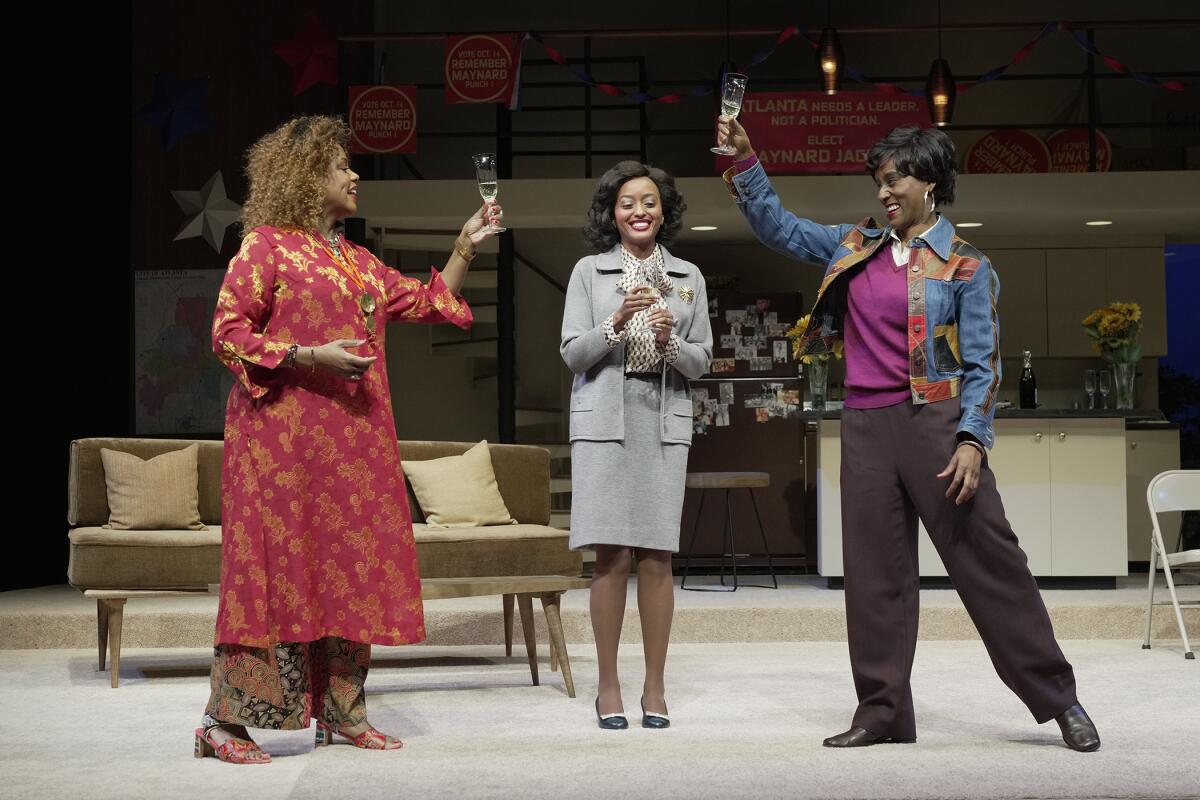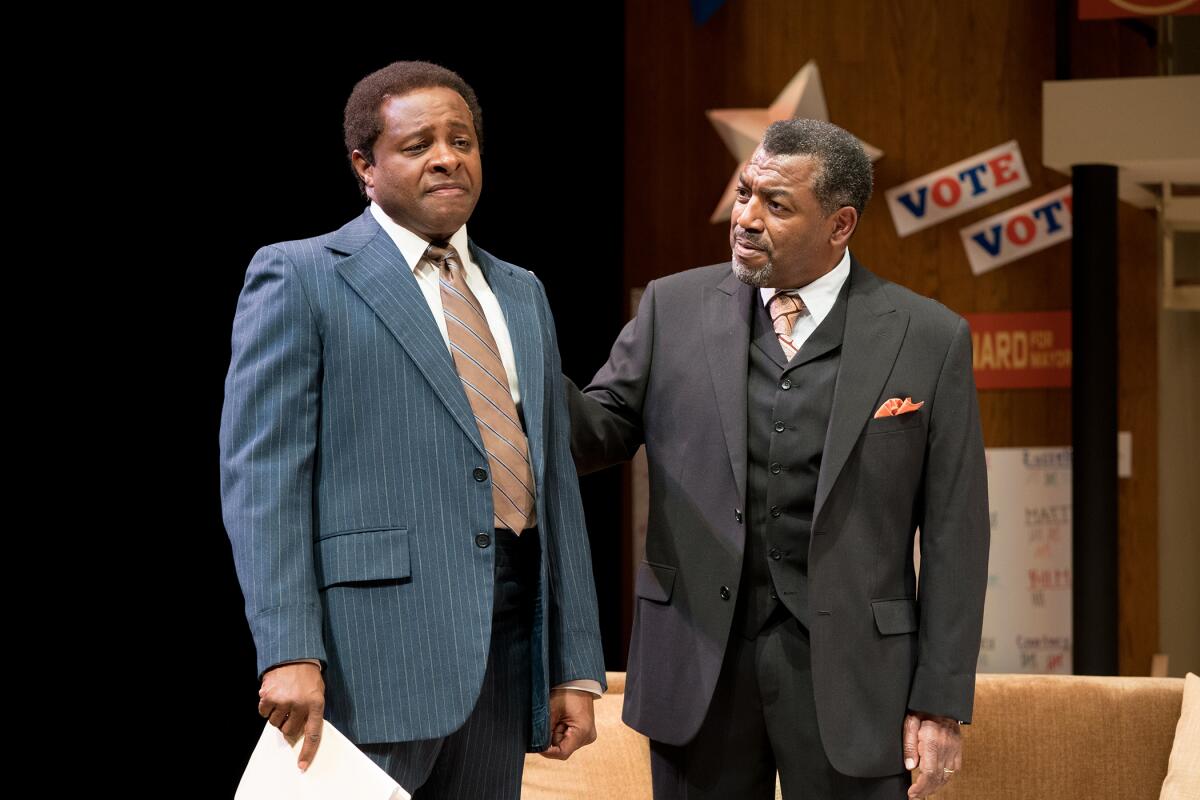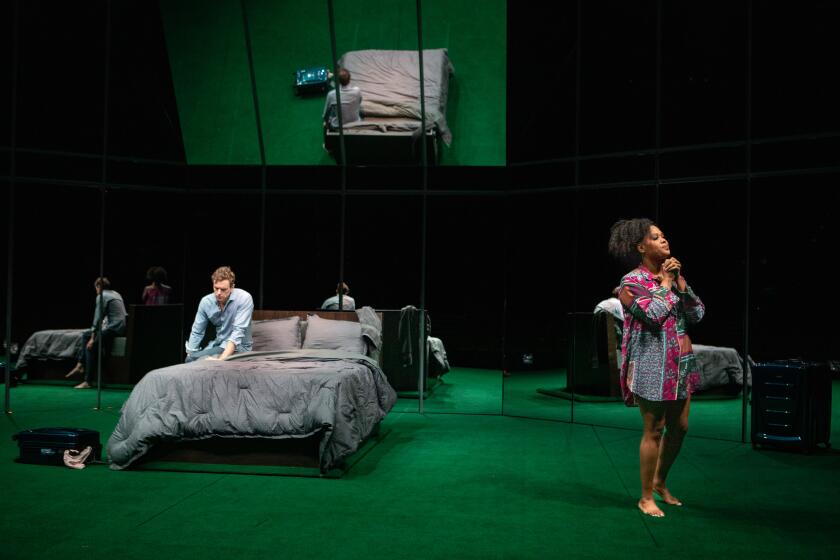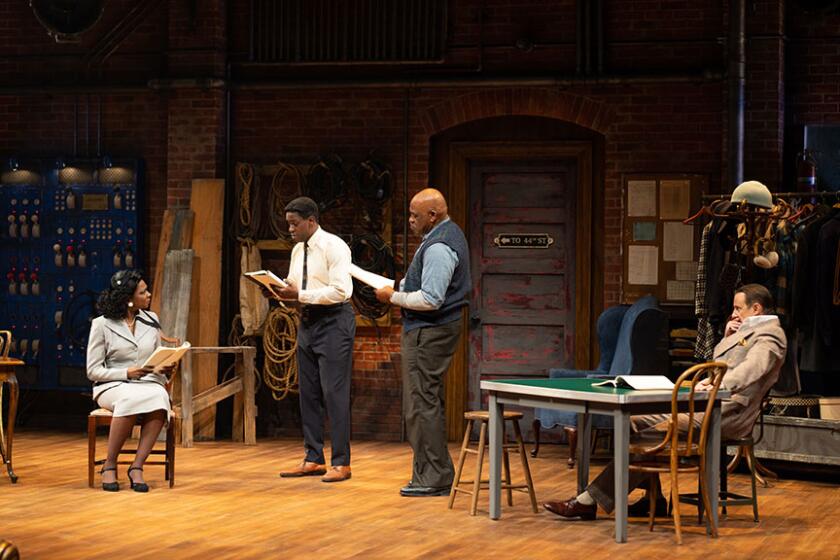Review: At South Coast Repertory, ‘Paris’ aims to deliver what we sorely need: some laughs

- Share via
Playwright Pearl Cleage, author of “Blues for an Alabama Sky” and “Flyin’ West,” worked on the 1973 campaign that made Maynard Jackson the first Black person to be elected mayor of Atlanta. She subsequently served as his press secretary and director of communications, giving her an inside view of history.
In “What I Learned in Paris,” which starts in the wee hours of election night after Jackson’s win, she dramatizes not so much the political obstacles to this watershed victory as the behind-the-scenes relationships that tell a messier human story. The 2012 play, which had its West Coast premiere at the Colony Theatre in 2014, is now at South Coast Repertory in a new production directed by Lou Bellamy.
A comedy that sometimes feels like an evening soap opera, “What I Learned in Paris” weaves a tangled web of romantic intrigue. Gender concerns are front and center as women on the campaign start to feel sidelined as the men swing into triumphal action. But the personal eclipses the political in a play that hinges on whom Ann (Kaye Winks), a 25-year-old secretary, will choose for a husband.
The situation is complicated because everyone assumes that she’s already married to J.P. Madison (A. Russell Andrews), a trailblazing, middle-aged Black lawyer who’s just been nominated by Jackson to be city attorney. But their Vegas wedding was aborted, and he needs to officially tie the knot to clean up this little lie.
The trouble — well, one piece of trouble — is that John (James T. Alfred), J.P.’s junior law partner, has fallen madly in love with Ann. And the feeling seems to be reciprocal, if the intensity of their secret smooch is any indication.
Lena (Celeste M. Cooper), whose get-out-the-vote efforts were key to Jackson’s mayoral win, serves as level-headed witness to the shenanigans. She becomes a silent partner for Eve (Erika LaVonn), J.P.’s ex-wife, a formidable earth mother who has just moved back from California with her own ideas about how this new era of Black empowerment in Atlanta should play out.
“Slave Play,” which confronts America’s race problem through depiction of experimental sex therapy, is a controversial work making its West Coast debut.
Eve, who flounces around in groovy ensembles that translate the early 1970s zeitgeist, has returned with the intention of creating a local salon for cultural and political power brokers. But as the play’s catalyst and most enthralling character, she’s also tasked with bringing together the various strands of Cleage’s unwieldy plot.
Bellamy’s production does its best to keep this overloaded comedy cranking. The costume designs of Dana Rebecca Woods and the classic R&B that arises between entrances and exists on Vicki Smith’s generic campaign headquarters set are sometimes more exciting than the play itself.
The comedy can feel strained, especially when Winks’ Ann is having one of her exaggerated crying fits. There’s not much chemistry between her and Alfred’s John, who’s a more age-appropriate suitor than J.P.

To be honest, Winks’ Ann seems too young for both of them. In fact, it wasn’t until she blurted out with some revulsion that J.P. is older than her father that I realized what was supposed to be obvious about this triangle all along.
First staged in 1955, the play — in a new production at the Old Globe Theatre in San Diego — gives rise to enduring questions about racism in American theater.
All-seeing Eve recognizes that it would be a mistake for Ann to marry J.P. out of a sense of obligation to the Black cause, which he has spent decades working to advance. Making good on her name, Eve is a temptress, but the forbidden knowledge she dangles is that female liberation is part of civil rights.
Sweeping across the stage like a spray of the most enchanting perfume, LaVonn is marvelously alluring in the role. Her Eve has defiantly come into her own, mind, body and spirt, and her seductive example of emancipated strength casts an irresistible spell on everyone, including Cooper’s admirably independent Lena, who discovers that professional success needn’t entail enormous personal sacrifice.
The audience can’t help similarly basking in Eve’s company, even when the play drags to its predictable comic close. “What I Learned in Paris” falls into unsubtle plot rhythms more familiar to network television. Cleage sets out to entertain. The results are mixed, but Eve is a character who deserves her own spinoff.
‘What I Learned in Paris’
Where: South Coast Repertory, 655 Town Center Drive, Costa Mesa
When: 7:30 p.m. Wednesdays-Thursdays, 8 p.m. Fridays, 2:30 and 8 p.m. Saturdays, 2 p.m. Sundays. Ends March 19.
Tickets: $26-$93
Information: (714) 708-5555 or scr.org
Running time: 2 hours, 25 minutes (includes one 15-minute intermission)
More to Read
The biggest entertainment stories
Get our big stories about Hollywood, film, television, music, arts, culture and more right in your inbox as soon as they publish.
You may occasionally receive promotional content from the Los Angeles Times.













